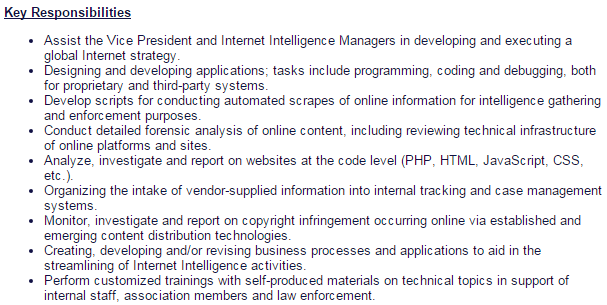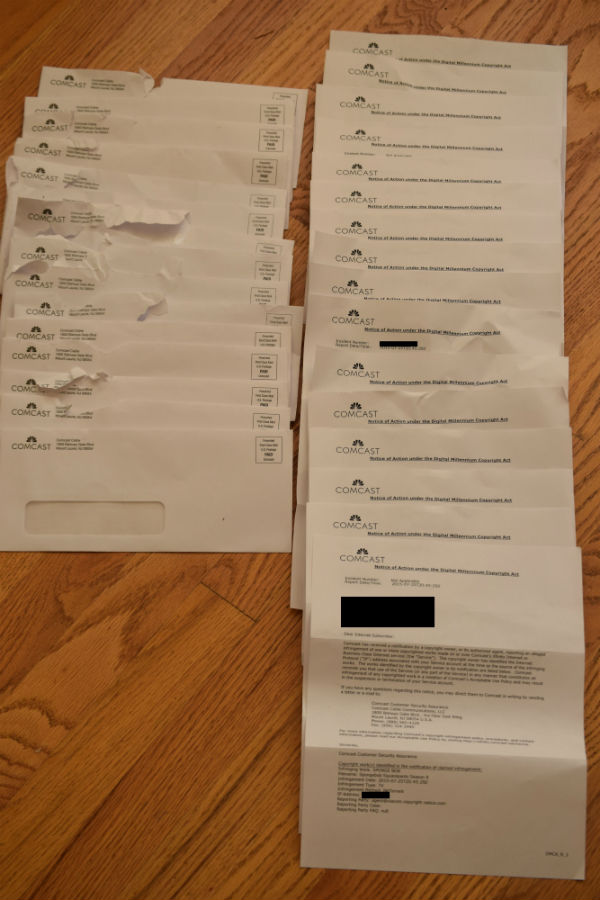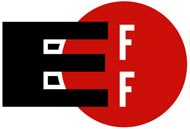Pornhub Uploaders Targeted By Copyright Troll
dimanche 9 août 2015 à 21:44 Having existed in the file-sharing space for at least a decade, copyright trolling is not a new phenomenon. As regularly reported though, it’s generally BitTorrent users that are targeted.
Having existed in the file-sharing space for at least a decade, copyright trolling is not a new phenomenon. As regularly reported though, it’s generally BitTorrent users that are targeted.
The IP addresses of torrent users are easily extracted from file-sharing swarms and through a subpoena to their Internet service providers, trolls can unmask sharers’ true identities. That being said, other methods have also been employed.
Earlier this year users of adult torrent site Empornium began receiving cash settlement demands from porn outfit TaylorMadeClips (TMC) but none appeared to have been tracked down by regular means. Empornium later revealed that a moderator account had been compromised and personal details of sharers leaked.
Subsequently, the co-owner of TMC admitted in public that information on alleged pirates had been purchased.
“We paid for a couple email addresses and sent a couple uploaders emails asking that they remove the torrents,” he explained.
“When that didn’t work they offered a list of people who had downloaded our content and I eventually paid for the information on people who had downloaded AND seeded the torrents because we have never had our lawyer contact downloaders, just uploaders.”
Given the way that situation played out, chins will now be scratched in response to the news that users of Pornhub are currently receiving similar threats from TMC.
A tip passed to TorrentFreak by troll monitoring site DieTrollDie indicates that several people who allegedly uploaded TaylorMadeClips content to Pornhub are now receiving demands to settle with the company for thousands of dollars.
“It has come to our client’s attention that you have distributed our client’s videos without authorization and in violation of our client’s rights,” the correspondence from TMC lawyer Mark Borghese begins.
“In particular, you have shared [..] our client’s videos on Pornhub under the username [redacted]. Each illegal distribution made of those videos constitutes a separate act of copyright infringement directly attributable to you.”
After threats to “forensically examine every single hard drive and other electronic storage device” in alleged infringers’ homes, Borghese provides “one last attempt” to settle. Unsurprisingly demands go up to several thousand dollars.
Considering the less than ethical Empornium case and the fact that Pornhub users’ details (IP addresses and emails) aren’t public on the site, TorrentFreak contacted Borghese asking him how he and TMC managed to track down the true identities of the Pornhub users.
Did Pornhub hand over the details to his lawfirm after legal action? Did the Pornhub users’ Internet service providers provide him with their real-life identities? Were alleged pirates’ identities obtained by other less conventional means?
Borghese did not respond to our requests for comment. We also contacted Pornhub who were equally silent.
Unfortunately that leaves only speculation, but nevertheless the situation provides food for thought. While obtaining information from services like Pornhub and ISPs might be the conventional route for trolls, if done properly it’s usually expensive.
Borghese previously told TF that TMC like to keep costs down. So, given TMC’s track record, taking a short-cut or two doesn’t seem out of the question.
What we do know is that these cases have common denominators, including that some targets bought their content directly from TMC. Watermarking of purchases might have been possible, but sources familiar with the situation suggest this is unlikely.
Additionally, some alleged infringers received notification from Pornhub that there had been complaints filed against their uploaded content. After the videos were deleted, some accounts were subsequently shut down by Pornhub, sometimes within days of a letter arriving from TMC’s lawyer.
Of course, it’s also possible (and likely) that more basic detection methods were used.
In all cases that we know of thus far, alleged pirates were contacted via direct email only (not via ISP), which is relatively unusual for trolls. However, some people have a habit of employing the same usernames and email addresses across several sites and as we’ve seen in the past, those can prove extremely revealing.
It’s impossible to say with any certainty if TMC intends to carry through with their threats to chase those who don’t settle, but a public confession by one of TMC’s co-owners earlier this year in the wake of the Empornium incident might shine a little light.
“If you haven’t acted on the letter then nothing else will happen since we don’t follow up except for in the most extreme cases where there is malicious intent or the pure volume of files being pirated by one person is too large,” he wrote.
In any event, the case detailed above shows that some trolls are comfortable in tracking down pirates, not just on BitTorrent, but wherever they roam – and by any means possible.
Source: TorrentFreak, for the latest info on copyright, file-sharing, torrent sites and the best VPN services.
 In its quest to stamp out piracy, the MPAA continues to evolve its anti-piracy strategies and tools.
In its quest to stamp out piracy, the MPAA continues to evolve its anti-piracy strategies and tools. 
 Like many large Internet providers in the United States, Comcast forwards DMCA notices to subscribers who have allegedly downloaded pirated material.
Like many large Internet providers in the United States, Comcast forwards DMCA notices to subscribers who have allegedly downloaded pirated material. 
 Tens of millions of DMCA-style notices are sent to online services every week complaining about copyright infringement. While most are accurate, some contain errors.
Tens of millions of DMCA-style notices are sent to online services every week complaining about copyright infringement. While most are accurate, some contain errors. After a massive wave of opposition more than three years ago, the Stop Online Piracy Act died and dozens of technology-focused companies and websites breathed a sigh of relief. But despite its demise the memory of SOPA has lived on, particularly in the minds of those who opposed it.
After a massive wave of opposition more than three years ago, the Stop Online Piracy Act died and dozens of technology-focused companies and websites breathed a sigh of relief. But despite its demise the memory of SOPA has lived on, particularly in the minds of those who opposed it.